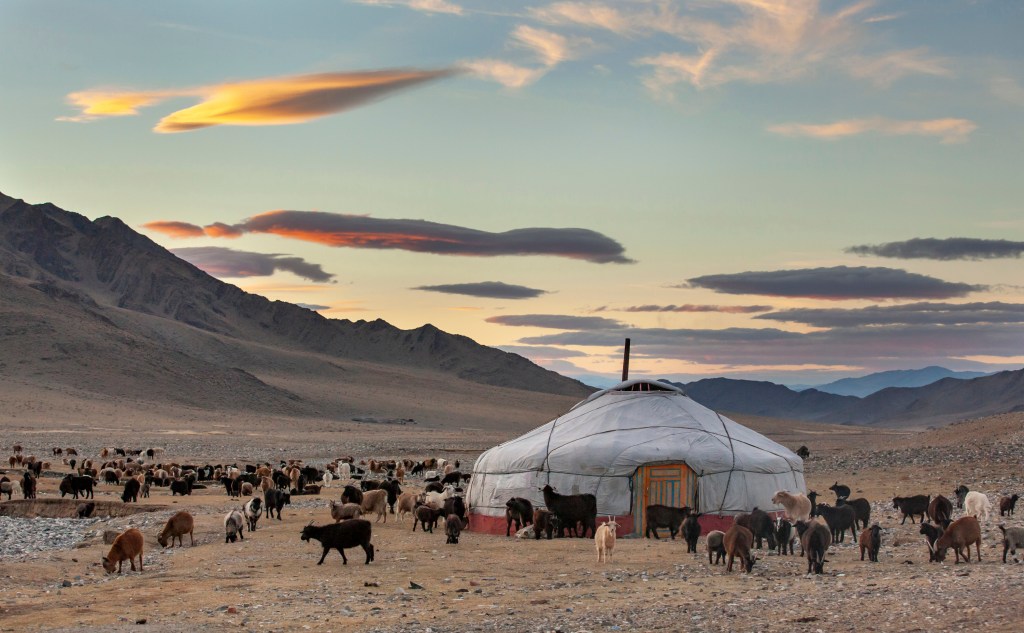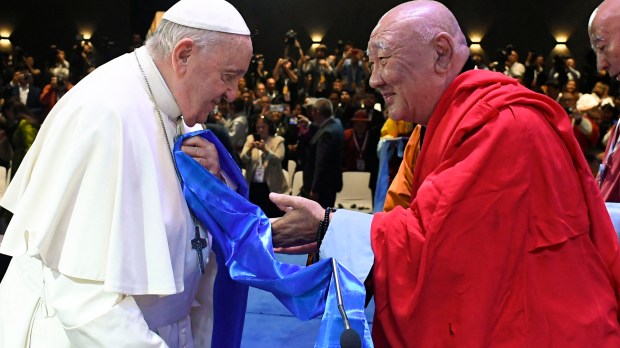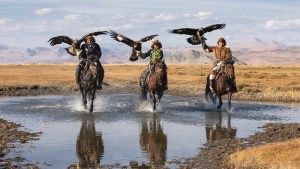Dialogue between believers “does not gloss over differences, but helps us to understand them, to preserve them in their distinctiveness and to discuss them openly for the sake of mutual enrichment,” said Pope Francis at an interfaith meeting held at the Hun Theatre in Ulaanbaatar, on September 3, 2023. The meeting was an important moment of his trip to Mongolia (August 31 – September 4), the first visit of a pontiff to that country.
Under the “ger” of the Hun Theatre, a conference hall in the shape of a traditional yurt, the pontiff was able to exchange views with representatives of 11 religions present in Mongolia. Among others, he heard a speech by Kamba Nomun Khan, abbot of the Gandan Buddhist monastery, who warmly welcomed him with a blue silk shawl.
An indirect reference to the Dalai Lama
The Buddhist leader spoke of the persecution to which his co-religionists have been — and continue to be — subjected. He took care not to name those guilty of this persecution, be it the Communist regime in power in the past in Mongolia (then a satellite country of the USSR) or the ongoing repression perpetrated by Beijing in recent years.
Kamba Nomun Khan then described as a sign of their resilience the purported discovery, in 2016, of the 10th reincarnation of the Bogd by the Dalai Lama. This event, essential for Mongolia’s Tibetan Buddhist community because it designates its most important leader, had been strongly criticized by China.
For his part, the abbot of the Daschischoiling monastery in Ulaanbaatar, Dambajav Choijiljav, defended in his speech a religious approach based on peace and harmony. These values may appear as a “simple absence of conflict, but are in fact the positive conditions that make the cultivation of the spirit possible.”
A representative of shamanism — the cult of the “eternal heavens” and glorious ancestors, in particular Genghis Khan — defended traditional Mongolian tolerance as a vision of religions living in peace alongside each other.
Fr. Antoine Gusev, rector of Mongolia’s only Russian Orthodox parish, recalled the many saints Mongolia had brought to the Orthodox Church, such as Peter of Ordinsk, John of Ustyug, and Paphnutius of Borovsk.
The Pope then heard from representatives of the Jewish, Baha’i, Muslim, Hindu, Evangelical, Adventist, and Jehovah’s Witness communities.
A humanity between heaven and earth
The last to speak, Pope Francis addressed the leaders of other religions “as a brother in faith to those who believe in Christ, and as a brother to all of you in the name of our shared religious quest and our membership in the one human family.”
Pope Francis situated his journey in continuity with the expedition of the Flemish Franciscan Guillaume de Rubrouck, sent to Mongolia by St. Louis in the 13th century, who had reported traveling these lands, seeing “nothing but the sky and earth.”
“The sky, so clear and blue, embraces these vast and imposing lands, as if to remind us of the two essential aspects of human life: the earthly, made up of our relationships with others, and the heavenly, consisting in our quest for the transcendent Other,” said Pope Francis.
“The social significance of our religious traditions can be gauged by the extent to which we are capable of living in harmony with other pilgrims on this earth and can foster that harmony in the places where we live,” explained Francis, sensitive to the Asian quest for harmony. “Narrowness, unilateral imposition, fundamentalism and ideological constraint destroy fraternity, fuel tensions and compromise peace,” he warned.
He also condemned sectarian violence and persecution, referring in particular to the past suffering of Buddhist communities.
As he forcefully asserted in his encyclical Fratelli tutti (2020), the Pope declared that religions have a common responsibility towards humanity. Indeed, when we are “concerned only with earthly interests, humanity ends up destroying the earth and mistaking progress for regress, as attested by so many injustices, conflicts, persecutions, environmental disasters and great disregard for human life.”
Expressing his admiration for Mongolia’s sense of hospitality, the Pope referred to “the experience of the Catholic missionaries from other countries who were welcomed here as pilgrims and guests, and gently entered into this culture, bringing their humble testimony to the Gospel of Jesus Christ.” He noted that the ger, the traditional nomadic dwelling, expresses a “harmony, togetherness and openness to the transcendent. And this, in turn, inspires a commitment to justice and peace, grounded in our relationship to the divine.”

The Pope recalled the ecumenical and interreligious commitment of the Catholic Church, “in the eternal dialogue between God and humanity that took flesh in the person of Jesus Christ.” As human beings, he said, “we share a common origin that confers equal dignity on everyone, and have a shared path that we can only travel alongside one another, as we dwell under the one sky that surrounds and illumines us,” the Pontiff added.
He concluded by quoting the Danish philosopher Søren Kierkegaard: “Everyone was great in proportion to the object of his hope. One was great by hoping for the possible; another by hoping for the eternal; but he who hoped for the impossible was the greatest of all.” He invited all his interlocutors to dare to walk “together with eyes lifted to heaven, our living in this world in harmony.”



